Bpaet the Elephant Finds What He Seeks
(For Arjarn Dan Jakrapop Ruangrit King and Arjarn Dr. Ying Yaemsiri-King. *Wai*)
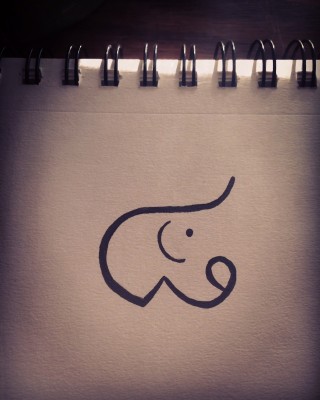
Once upon a time, deep in the forests of northern Thailand, a little elephant lived with his family by a clear stream at the base of a waterfall. His name was Bpaet1, for he was the eighth born in his generation. He had an older sister named Song2 and six cousins of varying ages. His mother, father, aunts, and uncles helped raise the children, found good food, and protected each other from tigers. They were not rich and lived a quiet, simple life, but they loved their home and had everything they needed. Bpaet was the youngest, until his cousin Gao3 was born. Naturally, the family doted over the new addition and made much of his arrival. Though putting on a good face when his family was watching, Bpaet resented his new cousin, who seemed to steal all the attention that had previously been showered on Bpaet.
One day, as Bpaet waded in the stream away from his cousins, who were engaged in splashing and blasting each other with water, he thought to himself, “My family doesn’t love me enough. They used to bring me food and wrap me with their trunks. They used to let me sleep as much as I wanted, but now because of that stupid Gao, I have to go out with my cousins and aunts to find food. Now, they are always holding and rocking him. He gets to sleep all he wants, and I’m left to fend for myself.” Looking down at his reflection, he felt sorrier and sorrier for himself and grew angrier and angrier with Gao. Slapping his reflection with his trunk, he declared, “I need a new family. One that really appreciates me. I will go out and find one.”
And without so much as a wai4 or goodbye, that is what he did.
Bpaet traveled east toward the sunrise. It was a pleasant, sunny morning that wasn’t overly hot, but by noon, the temperature had risen. Bpaet was hungry and grouchy. Exhausted and overheated, he plopped down in some tall grass to grumble and feel sorry for himself. While absorbed all in himself, the grass begin to wave, and the ground shook, but he took no notice until two adult elephants, one male and one female, stood over him. The female immediately began to fuss, asking if he was hurt or hungry, what he was doing out all alone, and did he have a family. Bpaet answered most of her questions truthfully but not all, for he told her that he didn’t have a family.
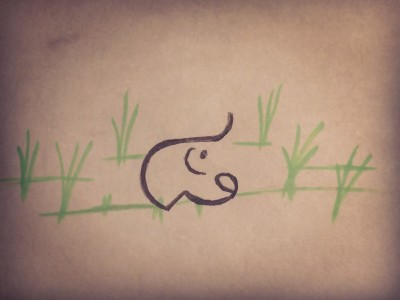
The couple decided to take Bpaet with them and adopted him on the spot, since they had recently lost their young daughter in a tiger attack. The new little family rejoined their herd, and the beaming parents recounted over and over the tale of finding their new son. Bpaet’s new life was everything he had dreamed. His new family doted over him, showered him with attention, and even called him Jaofa, which means “Prince”.
Years passed while Bpaet grew into adolescence, and in time, he became tired of the endless attention and being waited on hand and foot. “This is ridiculous,’ Bpaet thought. “I am not allowed to do anything on my own.” It was true. Since his adopted parents had lost a child once, they wanted to ensure that Bpaet was always cared for and safe. Though he was older now, Bpaet was still not allowed to venture away from the herd without adult supervision. His food was brought to him, and he was told where to bed down for the night. “I need my freedom,” Bpaet decided. “I will leave home and make my own way in the world – alone.”
And, without a wai or goodbye, that is what he did.
Bpaet journeyed south for several days. Along the way, he selected his own food, chose his own path, and successfully skirted a lone, lean tigress who was on the hunt. By the end of the week, he had chosen a spot for shelter that was near good food sources and water. So Bpaet lived alone and provided for himself for nearly a year. He took pride in the good decisions he made and his ability make his own way in the world.
But as time passed, Bpaet became dissatisfied. One day, having just finished a good roll in the dust, he thought, “Freedom and independence are all well and good, but I am very poor. Wouldn’t it be grand to be like the elephants in the city who eat all kinds of fancy foods, do work in exchange for gold, and wear jewels on their heads when they go out at night? I need wealth if I am ever to experience the best of everything, so I will go into the city and find wealth.”
And that is what he did.
Bpaet journeyed south again, this time, all the way to Bangkok. The city with its bright lights, continuous movement, and pockets of squalor mesmerized him, as he was accustomed to forests, grassy plains, and running rivers, but eventually, he remembered why he had come in the first place. As he meandered through the market, Bpaet met a white crane who owned a fruit stand and whose assistant had not shown up to work. Crane was in a mild panic since the farmer’s cart was ready to be unloaded for the day but he had no help. Bpaet unpacked the cart with ease and set out wares for the frazzled vendor. Before morning was over, he had acquired his first job.
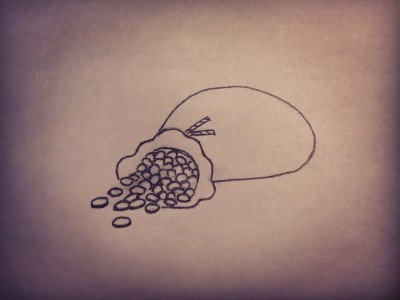
Over the next few years, Bpaet continued to work for Crane, and the enterprise thrived. The pair became business partners and managed many stands that eventually became stores. Through careful savings and prudent decisions, Bpaet acquired a substantial fortune, bought a home, dined on the best food, and enjoyed the finest entertainment.
But as years rolled on, Bpaet realized he was still not happy no matter how fat his purse grew or how wonderful his entertainment, food, and lodgings were. Not to mention, thieves were continually trying to take his stuff. He became sullen and depressed with greater frequency until one day he thought, “Money and things simply aren’t enough for me. No matter what I buy, I still find myself wanting more. Things break, and they can be stolen. Maybe what I need isn’t a thing. I will give up all my possessions, become a monk, and seek spiritual enlightenment and the face of God.”
And, without a wai or goodbye, that is what he did.
Bpaet left Bangkok and journeyed northeast into the Korat Plateau and to the Phu Phan Mountains. Atop a hill, overlooking many others that rolled like waves, he found a temple and monks that welcomed him. He heeded their instructions and learned to read the scriptures. He meditated, prayed, and helped the less fortunate that lived in surrounding communities. He was kind to all and was even careful where he stepped so as to avoid accidentally harming tiny creatures. He learned of the illusion and impermanence of the physical world, did his best to relieve the sufferings of others, and, for many years, was content on his spiritual journey.
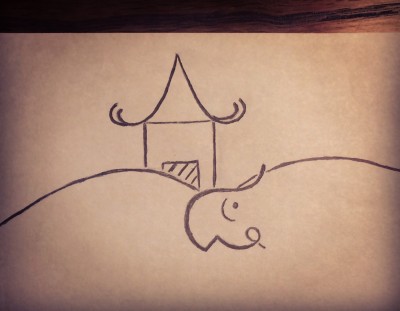
But eventually, Bpaet learned all the monks had to teach him, the scriptures and chanting became old, and his meditations were unfocused and unproductive. One day, as he stood in the temple courtyard overlooking the hills, he thought, “All this time devoted to spiritual growth, and I am still not satisfied. Though the monks have opened an entirely new world to me, they are so focused on what is inside, they seem to forget what is outside – that we have bodies that need to develop like our souls. They become thin from fasting, so that a stiff breeze could carry them away. I need to develop my body the way I have developed my soul. I will seek a master and learn the Art of Eight Limbs5. I will become the greatest Muay Fighter that has ever lived.
And, without a wai or goodbye, that is what he did.
Bpaet journeyed southeast until he neared the coast. Deep in the country, far from city life, he found a school run by the honorable Arjarn King. He was not immediately accepted as a student, but over weeks, he proved his dedication and devotion to the Arjarn6. On the hottest day of the year, he was allowed to begin training. Bpaet made it through his first day, though not without multiple breaks to vomit. Weeks and months passed. His body began to harden, and his focus became sharper. He did not vomit during training anymore.
Finally after years of training, Bpaet fought his first match. His Ram Muay7 dance dazzled the crowd, he won the fight by knock out in the first round, and his Arjarn was proud of him. Through the years that followed, Bpaet continued to train and fight. He was never beaten, and his reputation grew until he was considered by most to be the greatest fighter in all of Thailand.
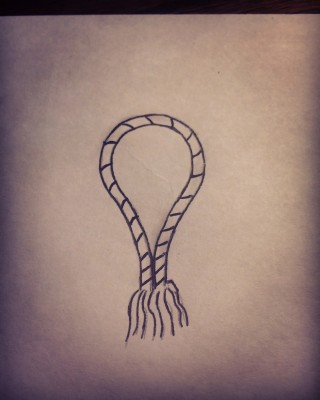
One day, he was invited to fight a new, relatively unknown fighter with a winning, though not undefeated, record at the famed Rajadamnern Stadium8 in Bangkok. Filled with confidence, he, his training partners, and Arjarn King journeyed to Bangkok for the fight. The challenger was a tiger from the northwest, who was both fast and precise with his strikes. Many expected Bpaet to knock him out early, but the tiger not only made it through all five rounds. He found the strength to deliver a beautiful flying knee to Bpaet’s chin fifteen seconds before the final bell. Bpaet was knocked out, and his title passed amid raucous cheers to the challenger. Much to the dismay of his honorable Master, Bpaet angrily stormed out of the ring once he regained consciousness, accusing the referees of calling the fight unfairly and his opponent of foul play as he went.
Alone in the lockers, nursing cuts and bruises, Bpaet thought to himself, “This is unfair. No matter how much I train my muscles, apparently, someone somewhere can beat me by some trickery. I don’t ever want to be beaten. I need to study, so I can know everything there is. Then, no one can surprise me, and I will always be the best. I will attend the best university and learn everything there is to know.”
And, without a wai or goodbye, that is what he did.
Bpaet gained admission to Chulalongkorn University9 that night. He studied every subject the illustrious school had to offer. He learned maths and sciences, history and literature. The artistry and beauty of his script was praised by this teachers, and he wrote poetry. He designed buildings and machines. He learned music, played instruments, and even acted in the theatre. Over the years, he earned many degrees and learned so much that he sometimes felt his head was physically growing larger. Bpaet took pride in his learning and always did what his teachers asked. He soon began to apply his knowledge to the every day world around him and developed many brilliant solutions to common problems.
But he found that others did not pay any attention to him when he tried to help them. Even if they listened to him politely, they would not implement the solutions he suggested. One night while pouring over a book after unsuccessfully suggesting to some builders a better way to move a ton of brick, Bpaet realized, “No one cares about what I know, even though I can help them. No one will listen to me. I need a good reputation, or my knowledge is worthless because I can’t apply it. I will become famous, and after I am famous, everyone will listen to me.”
And that is what he did.
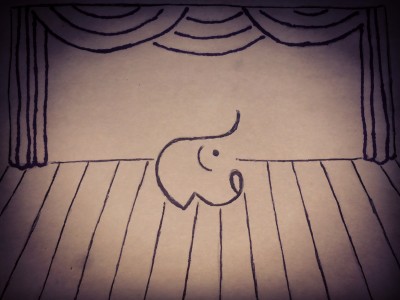
Bpaet went to the theatre to attend the next audition. Because of his studies, he was well spoken and had a good memory. He was also agile and strong because of his Muay training. The theatre hired him as a permanent actor, and in a short time, he gained popularity and a following, especially among the ladies. Soon, he was offered leading roles, into which he invested time and effort. In a few years more, he was the most famous actor in all Thailand, even performing in the royal court.
At first, Bpaet enjoyed meeting his admirers. They watched his every movement and expressed awe and admiration when he entered a room, but he soon realized that they didn’t really care about what he had to say. They wanted to hear about what it was like to be behind the curtain, they wanted to hear him deliver his most famous lines, but they did not want to hear about his solutions to problems. In fact, when he attempted to address a political issue at an event, his director warned him to never attempt to do so again. He ran the risk of alienating patrons, which was bad for business.
To make matters worse, the more popular Bpaet became; the more his admirers flocked to him just to be seen with him. He couldn’t even go out to dinner without people gathering around him and gawking as he ate. One night, after slipping out the back of a noodle house to get away from the crowd, Bpaet decided, “I am more unhappy than I have ever been. People won’t leave me alone, but they don’t care at all what I think or what I have to say. They just want to be seen with me so they look better to others. I need to be alone. I will find a solitary place and sit there forever.”
And that is what he did.
Bpaet walked out into the countryside until he came across a vast lake. Far out in the middle was a large flat rock, completely uninhabited, so Bpaet swam out to the rock and sat down in the center. He just breathed for a while, he meditated, and he basked in the silence and solitude. In this way, he passed many days. When he was hungry, he swam to the shore to dine on grasses and leaves. When he was thirsty, he drank from the lake. It rained on him a number of times, but still he sat on the rock in the middle of the lake – thinking and listening.
But in time, he grew lonely and wished for companions, and when he realized this, he began to lament. “Is there no where I can find what I need? I have been everywhere, done everything, had everything, given up everything, and still, I am not satisfied.”
At that time, Ko the water dragon, who was swimming in the lake, heard Bpaet’s wailing, approached the rock, and stuck her head up and out of the water.
“Friend,” she asked in a calm, soothing voice. “What is the meaning of this unsightly outburst? You are disturbing the flow of the river by sending shock waves and tremors throughout.”
“All my life,” cried Bpaet, “I have been searching for the things I need. Every time, I have found what I was searching for, and every time, I was still unsatisfied. Nothing in this world can give me peace or meet my needs, so I will sit on this rock and cry until I dissolve into my own tears and flow out to sea with the river.”
Ko scowled and thought to herself that it might actually be far better if she left him to carry out his plan, but seeing his sad, delusive state, she felt sorry for him and said what was, to her, the most obvious. “Well perhaps, you’ve never known what you need, and so you’ve been looking in all the wrong places.”
“I will know it when I find it!” Bpaet bristled. “But where else is there to look? I have been all over with no success.”
Ko regarded him with knowing eyes. “I need to go back inside now.” And with that, she disappeared into the depths of the river.
Then Bpaet sat still and ceased his wailing. For as long and hard as he had searched the world, he had not looked inside. So he thought of his family, his adopted family, his independence, his enjoyment of wealth, his spiritual growth in poverty, his strength through Muay training, his learning and intellect, his reputation, and his feelings when he was alone – in every stage of his life, he was experiencing, growing, living, but he had preoccupied himself with searching for particular satisfactions. He had also insisted those things had to be what he thought they should be, not what they were. As a result, he had not always behaved honorably. There were, in fact, a number of incidents of which he was now ashamed, and with each incident, the fault was his own. His actions were his own choices. They were prompted by his desires, and if desires came from inside, perhaps satisfaction came from inside as well.
And suddenly, Bpaet didn’t feel alone anymore. He got up off the rock and went back to town. He did a show and greeted his admirers after it, smiling and laughing with them. Slipping away once some of the commotion died down, he went home, read of a current problem in the newspaper, wrote down a solution, and went to sleep. In the morning, he rose before dawn and journeyed back to his Muay school where his former opponent was now a student of Arjarn King. Entering the school, he bowed low to his Master and opponent and apologized sincerely for his selfish, shameful conduct after the fight. Arjarn King and his opponent offered Bpaet a rematch, which he accepted. He lost, but this time, he gracefully accepted his defeat, with a wai to both and congratulations to his opponent. Having made amends, he journeyed back to the temple on the Korat Plateau and showed respect and gratitude to his spiritual teachers. He meditated, read the scriptures, and finally found the face of God. He then traveled back to Bangkok and met with Crane, his old business partner. Crane was thrilled that Bpaet was alive and well, and Bpaet gave him some sound business advice he sorely needed. Back through the grasslands and to the north, Bpaet found the first place he had lived alone. He spent the night there and had a hearty meal of his own creation while the stars twinkled overhead. In a few days, he found his adoptive family and bowing low, expressed his regret for abandoning them. Despite his hurtful actions, they forgave him and welcomed him. His adoptive parents were now alone since the herd had moved on without them after Bpaet’s disappearance. He invited them to come with him back home, which they gladly accepted. So they journeyed back to the base of the waterfall and found Bpaet’s family. Once again, he bowed low, offering his sincerest apologies for his immature, hurtful actions, lack of respect, and taking them all for granted. And the family, including Gao (who was now an adult too) welcomed Bpaet and his adoptive parents into the herd.
They all made their home by the waterfall, and in time, Bpaet became the most respected, hardest working, most innovative, and strongest member of the herd. He loved all of his family and treated them as well as he treated himself. He genuinely enjoyed his life, and that joy was contagious to everyone who met or knew him.
So Bpaet the Elephant finally found what he sought – peace and happiness that couldn’t be lost because it came from inside.
Notes
- Bpaet is “eight” in Thai.
- Song is “two” in Thai.
- Gao is “nine” in Thai.
- Wai is the Thai sign of respect. It is done when greeting someone or taking leave. To wai, one folds his/her hands at the center of his/her chest and lowers the head while simultaneously lifting the hands to the bridge of the nose. The longer one holds the wai, the more respect he/she shows for the person.
- The Art of Eight Limbs is known throughout the rest of the world today as Muay Thai – a martial art that includes strikes from the shins, knees, elbows, and fists (thus eight limbs). Clinching and sweeps are also allowed.
- Arjarn is the highest teaching rank in Muay Thai. Muay Thai has no belt system – one is either a student, a Kru (teacher), or an Arjarn (rather like an esteemed professor).
- The Ram Muay is a ceremonial dance performed by the fighter before a fight. It shows honor to the fighter’s teacher, family, and country.
- A famous Muay Thai stadium in Bangkok.
- The oldest university in Thailand.
Leave a Reply